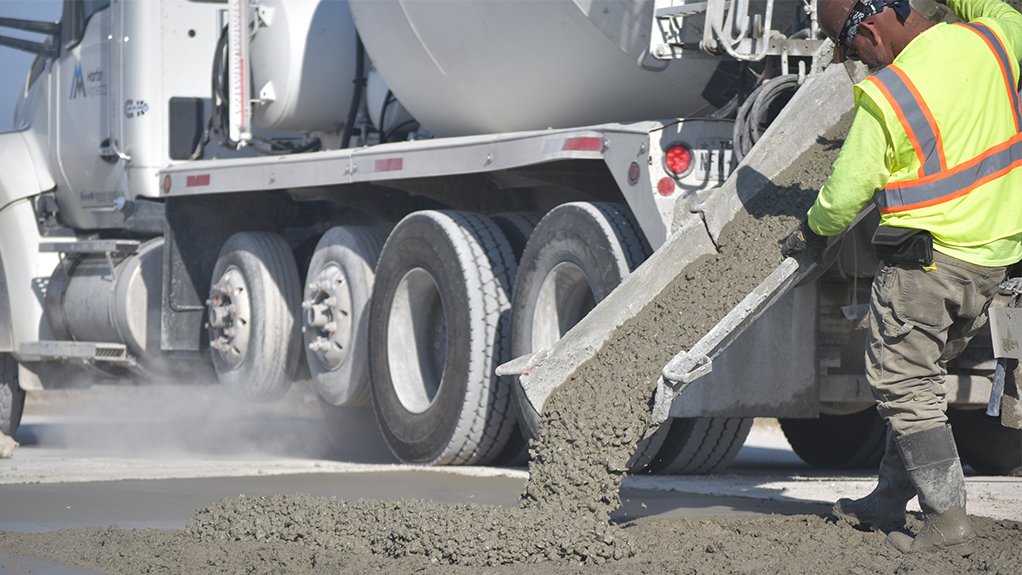Curing concrete in cold weather to keep workflow on track
Low temperatures and cold weather conditions are known to slow down the curing of concrete, leading to the disruption of production schedules. The use of accelerating admixtures, or accelerators, can help tackle the problem especially in South Africa’s cold winter months, says CHRYSO Southern Africa.
Company concrete business unit director: domestic and sub-Saharan Africa Hannes Engelbrecht points out that temperatures do not even need to reach freezing point for the concrete hydration process to slow down and that the process stops when temperatures dip below about 5 °C.
He notes that a significant amount of concrete construction, such as the construction of wind turbine bases and foundations for solar PV infrastructure, takes place in provinces such as the Northern Cape and Eastern Cape where temperatures fluctuate widely. Efficient stripping time of formwork is crucial in allowing these projects to meet strict deadlines to complete construction and start delivering renewable energy.
“Low temperatures create a range of problems for contractors and concrete product manufacturers,” says Engelbrecht. “Similar constraints apply in the manufacture of precast products, where production must simply keep up with customer orders and delivery deadlines.”
He highlights that precast product manufacturers can use a combination of super plasticisers and accelerators to speed up stripping times and reduce the storage space needed for products to cure. Accelerators work during the first 18 hours of the concrete’s curing time to ensure efficient hydration required to depalletise. Should temperatures be lower than freezing point, this makes the concrete strong enough to resist the expansion of water as it freezes, preventing cracking.
There are two categories of accelerator – chloride and non-chloride. While chloride-based accelerators are usually the first choice, they cannot be used if there is steel in the structure or where steel reinforcing is present, owing to the risk of rust, corrosion and degradation, explains CHRYSO Southern Africa technical manager: concrete business unit Patrick Flannigan.
The accelerator is best applied once the readymix has arrived on site. The admixture allows for 30 minutes to 40 minutes of workability before the accelerated hydration begins, depending on the type of concrete mix.
Article Enquiry
Email Article
Save Article
Feedback
To advertise email advertising@creamermedia.co.za or click here
Comments
Press Office
Announcements
What's On
Subscribe to improve your user experience...
Option 1 (equivalent of R125 a month):
Receive a weekly copy of Creamer Media's Engineering News & Mining Weekly magazine
(print copy for those in South Africa and e-magazine for those outside of South Africa)
Receive daily email newsletters
Access to full search results
Access archive of magazine back copies
Access to Projects in Progress
Access to ONE Research Report of your choice in PDF format
Option 2 (equivalent of R375 a month):
All benefits from Option 1
PLUS
Access to Creamer Media's Research Channel Africa for ALL Research Reports, in PDF format, on various industrial and mining sectors
including Electricity; Water; Energy Transition; Hydrogen; Roads, Rail and Ports; Coal; Gold; Platinum; Battery Metals; etc.
Already a subscriber?
Forgotten your password?
Receive weekly copy of Creamer Media's Engineering News & Mining Weekly magazine (print copy for those in South Africa and e-magazine for those outside of South Africa)
➕
Recieve daily email newsletters
➕
Access to full search results
➕
Access archive of magazine back copies
➕
Access to Projects in Progress
➕
Access to ONE Research Report of your choice in PDF format
RESEARCH CHANNEL AFRICA
R4500 (equivalent of R375 a month)
SUBSCRIBEAll benefits from Option 1
➕
Access to Creamer Media's Research Channel Africa for ALL Research Reports on various industrial and mining sectors, in PDF format, including on:
Electricity
➕
Water
➕
Energy Transition
➕
Hydrogen
➕
Roads, Rail and Ports
➕
Coal
➕
Gold
➕
Platinum
➕
Battery Metals
➕
etc.
Receive all benefits from Option 1 or Option 2 delivered to numerous people at your company
➕
Multiple User names and Passwords for simultaneous log-ins
➕
Intranet integration access to all in your organisation





















